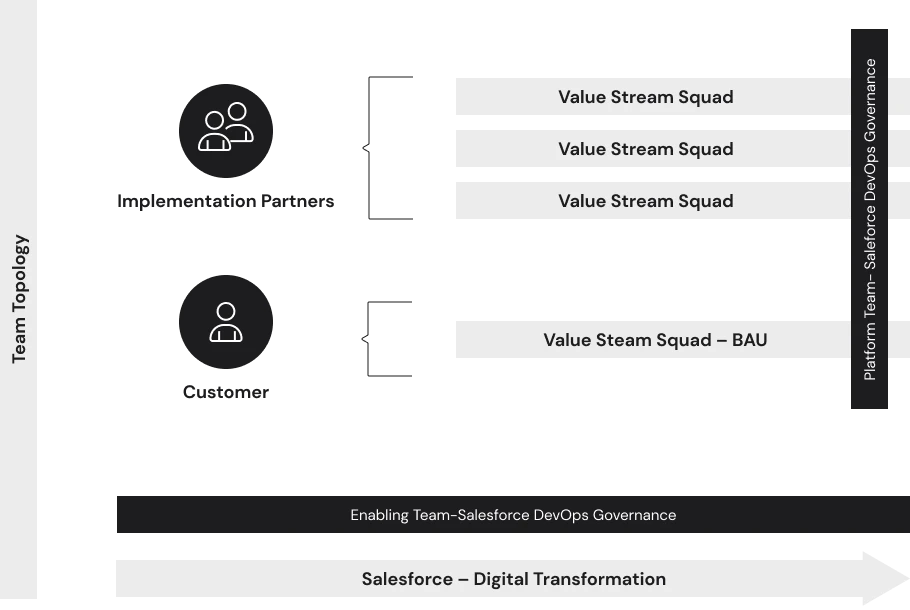05.
Devops Governance
We provide a comprehensive DevOps Governance solution for Salesforce projects. Our experienced team implements best practices for timely and high-quality project delivery. Partnering with leading software vendors, we offer cutting-edge technology. Streamline and optimize your Salesforce development cycle with us. Contact us today to learn more and optimize your organization’s Salesforce development.

DevOps For Salesforce
Salesforce is one of the most configurable platforms out there, almost all aspects of its seemingly infinite capabilities can be adjusted and expanded to meet the customers’ needs.

DevOps For Salesforce
Salesforce is one of the most configurable platforms out there, almost all aspects of its seemingly infinite capabilities can be adjusted and expanded to meet the customers’ needs.
Salesforce is one of the most configurable platforms out there, almost all aspects of its seemingly infinite capabilities can be adjusted and expanded to meet the customers’ needs.
It is also well known that Salesforce is a champion of Low-Code/No-Code, emphasizing declarative development as the preferable approach, which make it easier for newcomers to the platform to become productive from day one.
Salesforce allows developers to focus on the functionality required by the business, also, Salesforce has one of the best e-learning platforms ever made available to the public – Trailhead – training countless people in Salesforce from all backgrounds and bringing them to the IT market.

Through this, Value Stream Squads consistently delivering features into production. However, that is not what normally happen, as most projects struggle to deliver features. As Salesforce uses a quite complex data structure called Salesforce Metadata to define almost everything we can do on Salesforce UI (and a couple of things we cannot do on the UI). Identifying and deploying Salesforce Metadata can be overwhelming, error-prone, and time-consuming. Senior resources typically handle this task in Value Stream Squads.
Data extraction is also crucial, especially when third-party vendors rely on data records for Managed Package configuration. Storing and sharing extracted Metadata and Data Records requires support and a GIT repository. Some features may not be covered by Salesforce Metadata, necessitating manual intervention and project-specific administration for org configuration. Operational support is essential. The Low-Code/No-Code approach requires specialized tooling and Enabling/Platform Teams to address these challenges, and we can make that happen for you.
Technical Capabilities
S4 Digital’s Salesforce DevOps Governance, powered by FLOSUM, offers four major capabilities.
01.
DevOps
Native Salesforce DevOps tool with version control, environment management, code merge, conflict resolution, quality gates, release scheduling, and automation.
03.
Data Backup & Recovery
On-demand or automated full and incremental backup to your AWS, GCP or Azure instance. Selective compare and restore for your data.
02.
Data Migration
Native Salesforce data migration and management with filtering, masking, and preserving hierarchical relationships with optional filtering.
04.
Trust Center
Improve your security posture and stay compliant with a 100% Native Salesforce solution. Lock down your data and fully protect your organization from risks.
Principals Service Consumers

Implementation Partners
Implementations Partners are hired by Customer to delivery Salesforce customizations, normally employing Salesforce Architects, Salesforce BAs and Salesforce Developers.
Implementation Partners have their resources grouped on Value Stream Squad, each squad being responsible for delivering features.
Implementation Partners will be heavy consumers of DevOps Governance as they delivery features, pushing their changes very frequently to the DevOps platform.
Input
- Features/User Stories
- Manual Tasks
- Scripts
Output
- Status / Errors
Customers
Customers own Salesforce licenses and engage Implementation Partners for customizations. They define project scope, feature priority, resource allocation, and delivery milestones. Once the Salesforce implementation goes live, customers take responsibility for BAU changes and continue managing them as long as they use Salesforce.
Customers assume responsibility for Business-As-Usual (BAU) changes and continue managing them.
Input
- BAU Changes
Output
- Status / Errors
- Release Reports

Technical Team
01.
Platform Team
Enforces DevOps practices, manages environments, supports developers, and handles releases and deployments with valuable technical skills for implementation and operation.
02.
Enabling Team
Consultants with diverse skills, including Release Automation SMEs, Release Managers, and Salesforce Technical Lead, implement DevOps practices and guide developers in best practices.
S4 Digital's Salesforce DevOps Governance teams collaborate with Implementation Partners, unlocking Salesforce projects.


